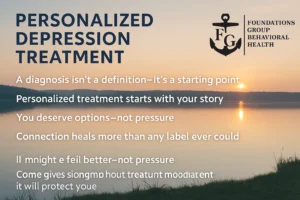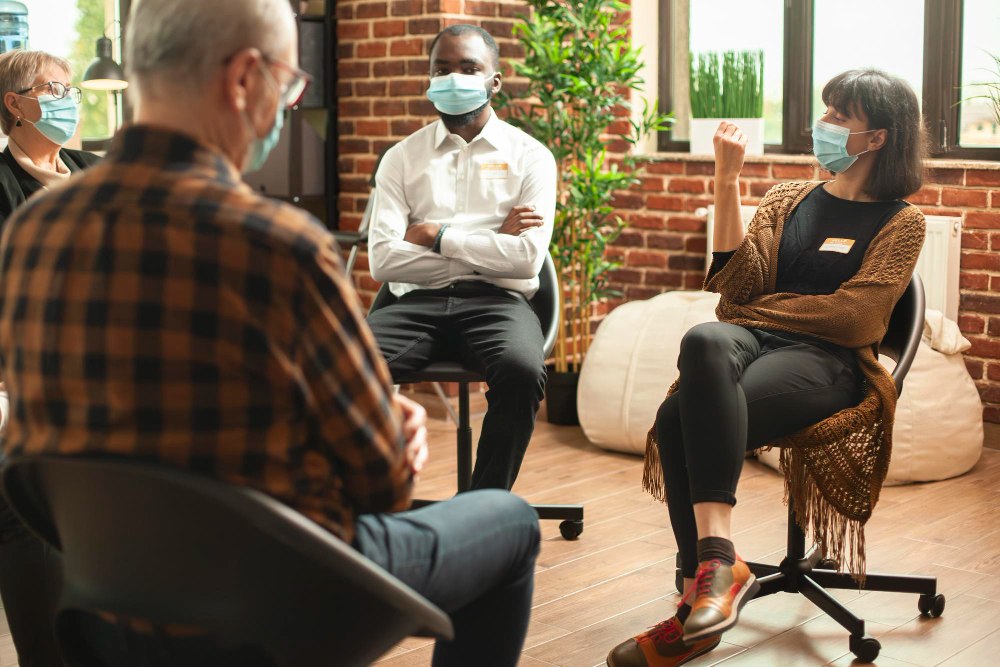“I didn’t want to be ‘a diagnosis.’ I just wanted to feel like myself again.”
That’s what she said, softly, after a long pause.
She had just been diagnosed with depression. The word itself felt like a verdict. Heavy. Final. As if it told her whole story, when in truth—it barely scratched the surface.
She didn’t feel ready for medication. She wasn’t against getting help. She just wanted to make sense of what was happening in a way that still left space for her.
We see this moment often at Foundations Group Behavioral Health. If you live in Cape Cod, Barnstable County, or Falmouth and you’ve just received a diagnosis of depression, we want you to know: there’s no one right reaction. And no one right way to move forward.
A Diagnosis Isn’t a Definition—It’s a Starting Point
Labels can feel loaded. Especially when they’re attached to something invisible, like depression.
Maybe you’re asking:
- Does this mean something’s broken in me?
- Will this follow me forever?
- Am I about to lose control over what happens next?
Here’s the truth: a diagnosis is simply a lens. It can help clinicians understand your patterns and offer more tailored support. But it does not define your value, limit your identity, or predict your future.
Think of it like a map. It gives you a sense of the terrain—but it doesn’t tell you how to walk the path.
Personalized Treatment Starts With Your Story
When she met with her therapist for the first time, there was no lecture. No assumptions. Just one open door and one gentle question: “Can you tell me what your days have been like lately?”
And so she did.
She talked about waking up tired. About how even things she used to enjoy felt gray. How she snapped at people she loved, then felt numb afterward. How she smiled on Zoom meetings and fell apart after.
She also mentioned that music still moved her. That walks sometimes helped, even if they didn’t fix anything. That she missed feeling curious—not just functional.
This was the beginning of a treatment plan. Not a form. Not a checklist. A story.
You Deserve Options—Not Pressure
When people hear “depression treatment,” they often think of pills first. And for good reason—medication can help many people.
But if you’re not ready for that step, or unsure if it’s right for you, that doesn’t mean you’re hard to work with. Or in denial. Or doomed.
She was nervous to bring it up. But we told her what we’ll tell you:
Treatment is a dialogue. Not a script.
You can begin with:
- Individual therapy
- Group sessions focused on coping skills
- Mind-body strategies like breathwork or movement
- Journaling, creative outlets, nature-based grounding
- Psychiatric consultation (if and when you’re ready)
Over time, she decided to explore a low-dose medication to complement therapy. But because that decision was hers, it felt like a resource—not a requirement.
If you’re looking for depression treatment in Barnstable County, MA or Falmouth, MA, know this: at Foundations, you will never be told that one treatment path is the “right” one. The right plan is the one that works for you.
Connection Heals More Than Any Label Ever Could
“I didn’t feel better the moment I started treatment,” she said. “But I felt less alone. That mattered more than I expected.”
Personalized care isn’t just about treatment modalities—it’s about relationship. Being seen. Heard. Held gently accountable by someone who understands this isn’t about fixing you—it’s about supporting you back into your life.
For her, that meant:
- Weekly therapy focused on managing emotional shutdowns
- A therapist who let her question the diagnosis without defensiveness
- Small wins that felt like progress: cooking dinner, replying to a text, laughing—really laughing—for the first time in months
The plan didn’t just treat her symptoms. It respected her soul.
Healing Is Personal—and It Doesn’t Have to Be Linear
There were days she felt grounded. And days she canceled sessions because it all felt too raw. That’s not failure. That’s healing.
Over time, she began to trust the rhythm of her own recovery:
- That bad days didn’t erase good ones.
- That treatment could stretch and bend with her.
- That she didn’t have to be “all better” to start feeling like herself again.
Personalized treatment plans work because they allow for flexibility, compassion, and context. They evolve. Just like you do.
If You’ve Just Been Diagnosed, Here’s What We Want You to Know
You might be feeling confused. Or numb. Or even relieved that something finally has a name. However you’re feeling—it’s okay.
What matters most isn’t the label. It’s what comes after.
The right depression treatment won’t strip you of your identity. It will protect it. Nurture it. Help you reconnect with the parts of yourself that got buried under exhaustion and sadness.
At Foundations Group Behavioral Health, we’ll meet you with curiosity, not conclusions. Whether you live in Cape Cod, Barnstable, or Falmouth—you have options. You have voice. You have time.
You don’t have to know everything right now. You just have to be willing to start.
FAQs for the Newly Diagnosed
Do I have to take medication if I start treatment?
No. While medication can help some people manage depression symptoms, it’s not required. Many treatment plans begin with therapy and evolve based on what feels helpful to you.
What if I disagree with the diagnosis?
That’s valid. Diagnoses are clinical tools—not moral judgments. A good provider will explore your concerns with curiosity and adjust the treatment plan as needed.
Can I just talk to someone without committing to a full program?
Absolutely. Starting with one conversation is often the best next step. Foundations offers low-pressure ways to begin, including individual therapy sessions or intake assessments.
How long will treatment last?
It depends on your goals, your symptoms, and your preferences. Some people benefit from short-term therapy; others find value in longer-term support. We’ll revisit your plan regularly to make sure it’s still serving you.
I’m in Cape Cod but not sure I can get to a center. Do you offer virtual options?
Yes. Many of our depression treatment services are available virtually, especially for residents in and around Cape Cod, Barnstable County, and Falmouth. We’ll work with you to find the right fit.
Will my treatment plan change over time?
It should. A personalized plan evolves as you do. If something stops working—or something starts working better—we adapt. You’re never stuck.
You deserve a plan that fits your life—not one that makes you disappear.
Call 888-685-9730 or visit our Depression Treatment in Cape Cod, MA to learn more about personalized care. You don’t have to be “ready.” You just have to begin.









